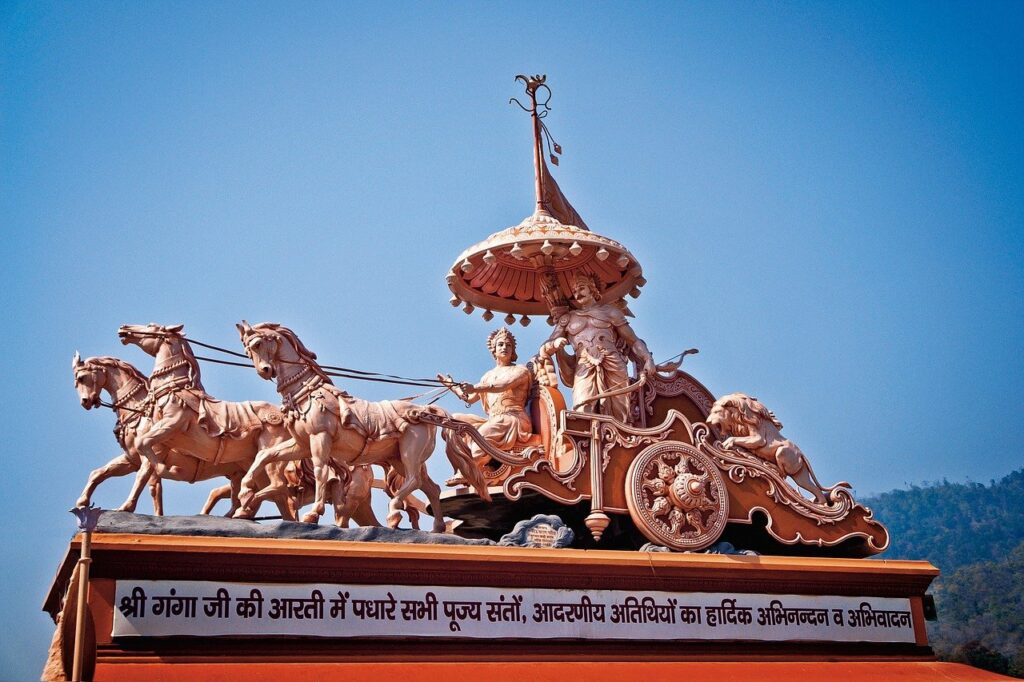
In this article, we delve into the awe-inspiring clash between two legendary warriors, Karna and Arjuna, an epic confrontation that stands as the pinnacle of the Mahabharata saga. This monumental battle unfolded on the 17th day of the Kurukshetra war, a day etched in history for its profound significance and the indomitable spirit of these two extraordinary heroes. After departing from the camp, Arjuna’s chariot raced toward the battlefield. As the fighting grounds drew nearer, he contemplated the challenging task of defeating his formidable adversary, Karna. The sun was already midway through the afternoon, and Arjuna knew that defeating Karna would require a fierce battle. He was well aware that he could not afford to be sidetracked by other Kaurava heroes, and he anticipated Duryodhana’s attempts to obstruct his path. The sounds of battle, the cries of warriors, and the clashing of weapons filled the air, confirming that Karna was amidst the Pandava forces, much like Mahadeva among the demons.
Brief Background – Who was Karna?
Karna, one of the half-brothers of the Pandavas, had a tragic birth and upbringing. He was the son of Kunti and the sun-god. Kunti possessed a mantra gifted by Durvasa Muni that allowed her to summon any deity, and out of childish curiosity, she invoked the sun god using this mantra. To her astonishment, the sun god appeared before her, discerning her desire to bless her with a child. Kunti was initially shocked, fearing that this would tarnish her virtue. However, the sun god persisted, expressing his concerns about potential humiliation if he left without fulfilling her wish.
Kunti, unwavering in her commitment to her virtue, continued to resist, searching for a solution that would not compromise her honor. The sun god assured her that her purity would remain untarnished. Consequently, the sun god entered her being through yogic prowess, and in due time, Kunti gave birth to a son adorned with celestial earrings and natural armor.
Despite this miraculous birth, Kunti faced a dilemma in justifying the child’s existence. Placing her trust in the benevolence of the sun god, she placed the infant in a basket and set it afloat in the flowing waters of the Ganges. The basket carrying the child eventually arrived on the shores of Champa, where Adhiratha, a leader of the suta tribe, and his wife Radha, embraced the child as a blessing. They raised him as their own, naming him Vasusena, who would later become renowned as Karna or Radheya.
Krishna’s Reassurance and Arjuna’s anger
Now let us return to discussing the battle of Kurukshetra. Observing his friend’s contemplative state, Krishna offered words of encouragement to Arjuna. He extolled Arjuna’s unparalleled valor and recounted numerous instances of brave heroes who met their end in battle against him. Krishna affirmed that no warrior in the world could withstand Arjuna’s might and assured him that Karna’s victory was improbable. Krishna urged Arjuna to end Karna’s arrogance, reminding him of the past injustices inflicted by the Kaurava leader, especially his mistreatment of Draupadi. As they approached the battlefield, Krishna continued to inspire Arjuna, instilling him with confidence and determination.
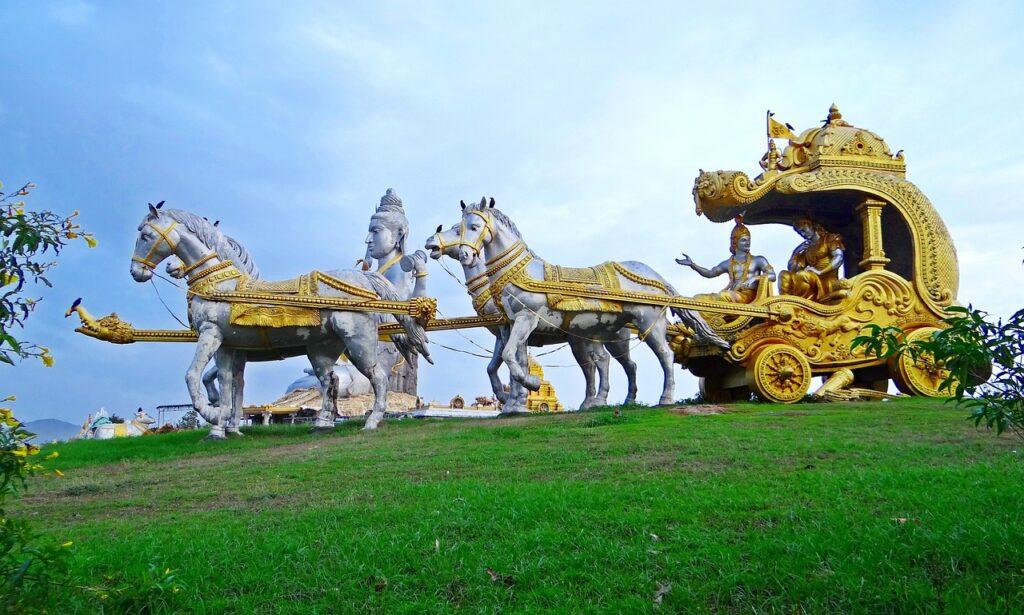
Arjuna’s anger surged as he recalled past injustices, including the infamous dice game and the tragic death of Abhimanyu. His resolve to confront Karna grew stronger. In the vicinity, he noticed Bhima, surrounded by Kaurava warriors and battling fiercely. Arjuna immediately rushed to his brother’s aid, unleashing waves of arrows to repel the Kauravas and free Bhima from the encirclement. His determination to confront Karna intensified as he drew closer to the battlefront.
Demise of Vrishasena and the Spectacular Clash of Titans
In the midst of the battle, Karna’s son Vrishasena confronted Arjuna after witnessing Bhima kill Dushashana. Vrishasena unleashed a powerful attack on Arjuna, briefly overwhelming him and Krishna. However, Bhima decided to leave Vrishasena to Arjuna. Arjuna then aimed a series of fiery arrows at Vrishasena, ultimately severing his head.
Karna, anguished by his son’s death, advanced towards Arjuna, and the two heroes met in a radiant clash, resembling two suns converging. Their exchange of arrows was cheered on by both armies, with martial music filling the battlefield. Celestial beings watched from above, uncertain of the outcome, drawing parallels to ancient battles.
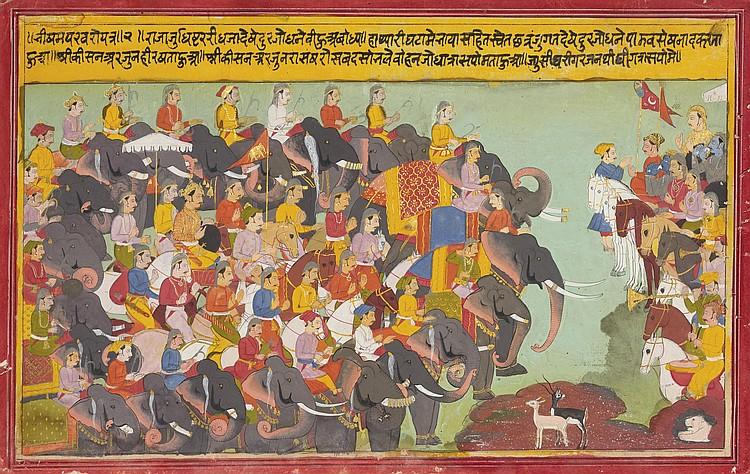
As Arjuna and Karna closed in on each other, their respective troops rushed to support them, leading to a fierce battle between the surrounding soldiers. Hanuman, who adorned Arjuna’s banner, leaped to Karna’s flag, causing chaos by tearing at the jeweled elephant’s rope. The horses of both warriors reacted furiously, and there were tense exchanges between Krishna and Salya, Karna’s charioteer.
The epic battle between Karna and Arjuna
Arjuna and Karna then unleashed torrents of arrows, filling the sky with their flying shafts, casting a dark shroud over the battlefield. These two warriors engaged in a relentless exchange of arrows, akin to the struggle between the east and west winds. As they deftly deflected each other’s attacks, they resembled the sun and moon emerging from behind clouds. Surrounded by their respective troops, they stood like Indra and Bali encircled by gods and Asuras. Their golden bows, in a perpetual state of tension, gleamed like the sun’s halos, while their arrows shot forth like radiant sunbeams. Their determination to annihilate each other was palpable, reminiscent of two suns destined to bring about the universe’s destruction at the end of an era.
In the midst of a fierce battle, thousands of soldiers, elephants, and horses were decimated as leading heroes on both sides engaged in combat. Arjuna faced a barrage of arrows from Duryodhana, Krpa, Sakuni, and Asvatthama but skillfully repelled them. The duel between Arjuna and Karna was so intense that no other warriors dared to approach. Both warriors sustained injuries, and blood flowed from their wounds. Krishna and Salya, despite their injuries, continued to maneuver their chariots.
Pandava soldiers urged Arjuna to defeat Karna and shatter Duryodhana’s dreams, while the Kauravas urged Karna to eliminate Arjuna and send the Pandavas into exile. Arjuna released a variety of arrows with different tips, and Karna countered with his own formidable arsenal.
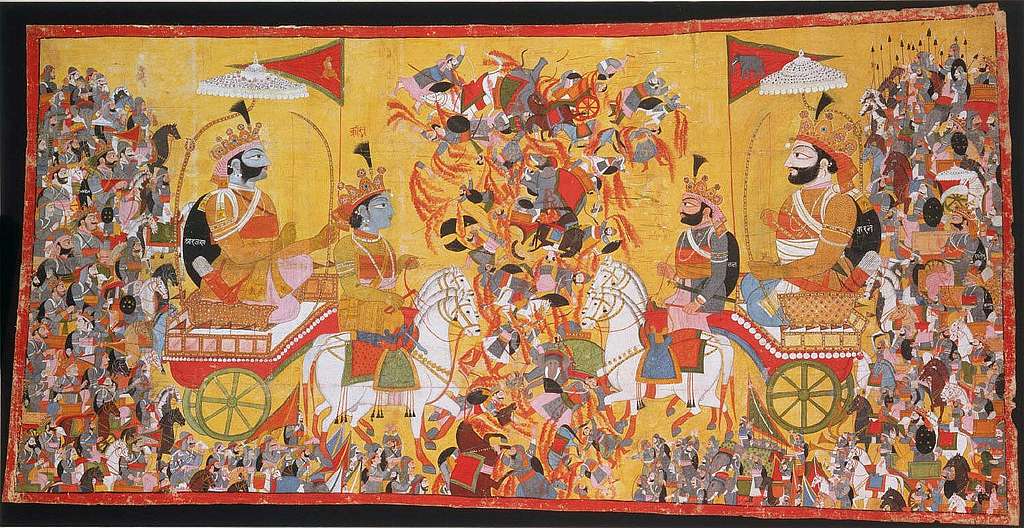
Suddenly, Arjuna invoked a potent celestial weapon, firing an arrow that illuminated the entire sky in all directions. The missile’s heat ignited the clothing and chariots of nearby warriors, causing them to burst into flames. It sped through the air with a crackling sound, resembling a forest of bamboo ablaze. Unfazed, Karna promptly employed the Varuna weapon, which extinguished Arjuna’s fiery projectile. Massive clouds materialized in the sky, releasing torrents of rain that quenched the flames Arjuna had ignited.
Arjuna commended Karna for his skill and launched another celestial weapon, dispersing the clouds. He then vanished from Karna’s sight, invoking a weapon gifted to him by Indra. Thousands of gleaming arrows adorned with vulture feathers soared from his Gandiva bow, showering Karna’s chariot, enveloping him, Salya, and their horses. With anger in his eyes, Karna invoked the Bhargava weapon, which intercepted all the arrows emanating from the Gandiva. The power of the Bhargava-astra spread across the battlefield, wreaking havoc on the Pandava forces, resulting in numerous casualties.
Witnessing Karna’s formidable prowess, the Kauravas cheered and brandished their weapons. Bhima, incensed, called out to Arjuna, urging him not to be lenient with the sinful Karna. He reminded Arjuna of Draupadi’s suffering and Abhimanyu’s death, urging him to eliminate Karna by any means necessary.
Arjuna clenched his teeth and fixed a determined gaze on Karna. Drawing a gleaming golden arrow from his quiver, he declared his intention to invoke the mighty Brahma weapon.
Krishna assented, and Arjuna placed the arrow on his bow. Focusing his mind, he invoked the brahmastra and launched it with all his might. The arrow blazed into the sky, followed by thousands of other arrows emerging from the Gandiva bow. These arrows resembled menacing snakes with bared fangs as they streaked across the battlefield toward Karna. Thousands of golden-winged shafts radiated from Arjuna’s chariot, striking down Duryodhana’s troops with devastating force. The ground was littered with colossal darts, lances, and battle-axes, resembling a scene of unparalleled destruction.
Karna responded with another celestial weapon, causing innumerable arrows to rain down upon Arjuna. These arrows descended with a hissing sound, akin to a torrential downpour. Simultaneously, they targeted the Pandava troops, resulting in a high casualty count.
Arjuna’s patience wore thin, leading him to unleash a series of powerful steel-tipped arrows on Karna, targeting his chest and causing heavy casualties among Karna’s forces. The Kauravas pleaded for Karna’s help, fearing Arjuna’s relentless assault. Karna responded with a fierce barrage of arrows, causing casualties among the Panchalas and Pandava soldiers.
Amidst the intense battle, Arjuna and Karna engaged in a relentless exchange of celestial missiles, with both showing moments of dominance. Warriors from both sides cheered and celestial beings in the sky applauded their valor.
Divine Intervention: Krishna saves Arjuna from Karna
During the intense battle between Arjuna and Karna, a Naga named Asvasena, filled with resentment toward Arjuna for killing his mother and brother in the Khandava forest, saw an opportunity for revenge. Asvasena assumed the form of an arrow and entered Karna’s quiver. Using his mystical abilities, Asvasena influenced Karna to consider using the Nagastra, a powerful celestial weapon.
Karna realized that he couldn’t overpower Arjuna through conventional means and devised a plan to catch him off guard. He rapidly fired arrows to momentarily incapacitate Arjuna, slicing his bowstring with a razor-tipped arrow. Karna then retrieved a golden arrow from his quiver of celestial weapons, and with precision, aimed it at Arjuna’s neck. Unbeknownst to Karna, Asvasena had infused the arrow with his mystical power.
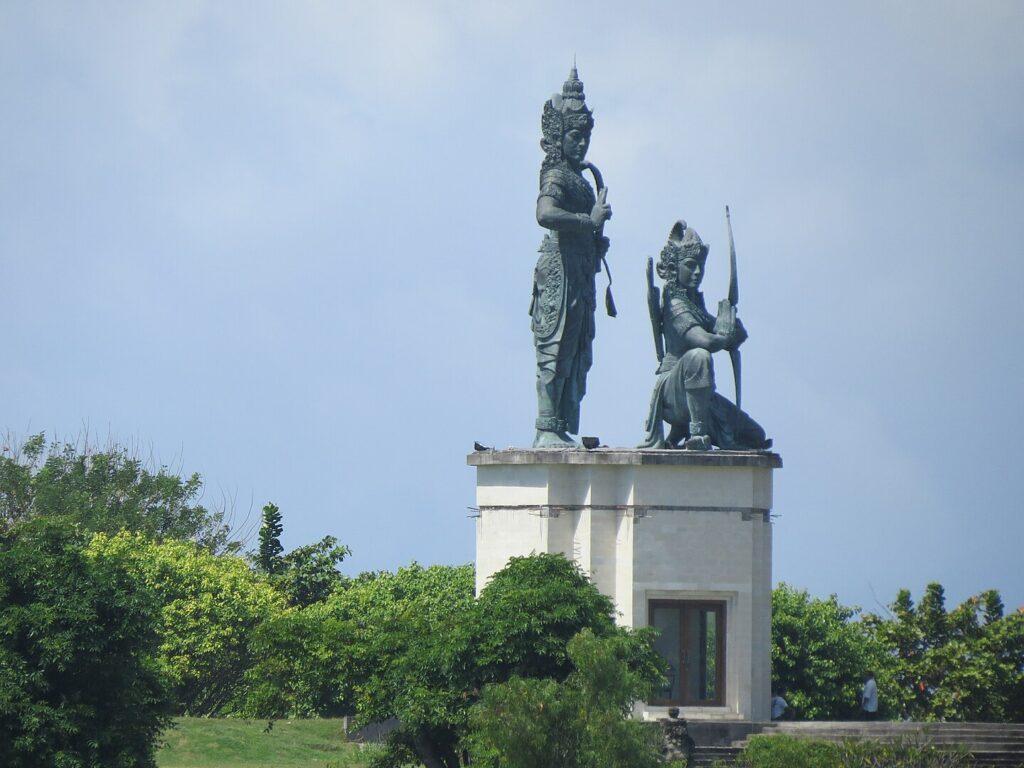
As Karna released the arrow, the celestial beings cried out in sorrow. The arrow raced toward Arjuna, creating a deafening sound and seemingly splitting the sky like a woman parting her hair in the middle. Observing the impending catastrophe, Krishna leaned forward and pressed the chariot down with His foot, causing the horses to tumble, and the chariot sank into the earth.
The Nagastra arrow narrowly missed Arjuna’s head but struck his diadem, sending it spiraling away like the sun falling from the heavens. The diadem landed on the ground, smoking and shattered by the force of the Nagastra, augmented by Asvasena’s personal power. The radiant celestial gems from the diadem scattered across the battlefield, resembling stars in the night sky.
Witnessing Krishna’s intervention saving Arjuna from certain death, the gods cheered and showered Him with flowers. Arjuna, now without his diadem, reined in his loose hair with a white cloth and restrung his Gandiva bow, ready to continue his battle against Karna.
Asvasena, unable to fulfill his vengeance, returned to Karna and revealed his identity as Arjuna’s enemy, vowing to avenge his mother’s death. Karna, however, declined to use Asvasena’s power again, emphasizing that he wouldn’t depend on another’s strength or employ the same arrow twice. Instead, he resolved to defeat Arjuna with his other formidable weapons and permitted Asvasena to depart as he pleased.
Karna’s Desperate Struggle : Earth swallows the wheels of his Chariot
Krishna descended to the ground and, with His own hands, raised Arjuna’s chariot from the earth. He swiftly climbed back onto it and urged the horses forward, encircling Karna. Arjuna, in a state of intense rage, continued his relentless assault on Karna, targeting his vital areas. Karna’s armor was pierced, shattered, and his helmet and headdress were knocked off, leaving him wounded and resembling a volcano spewing streams of lava.
Observing Karna incapacitated and passive, with his bow slipping from his grasp, Arjuna, in adherence to the rules of warfare, ceased his attack. However, Krishna expressed surprise at Arjuna’s decision, urging him not to spare his weakened enemy. Krishna emphasized that the wise do not show mercy to their foes, even in their distress. He encouraged Arjuna to finish Karna quickly, as Karna would pose a greater challenge if he recovered.
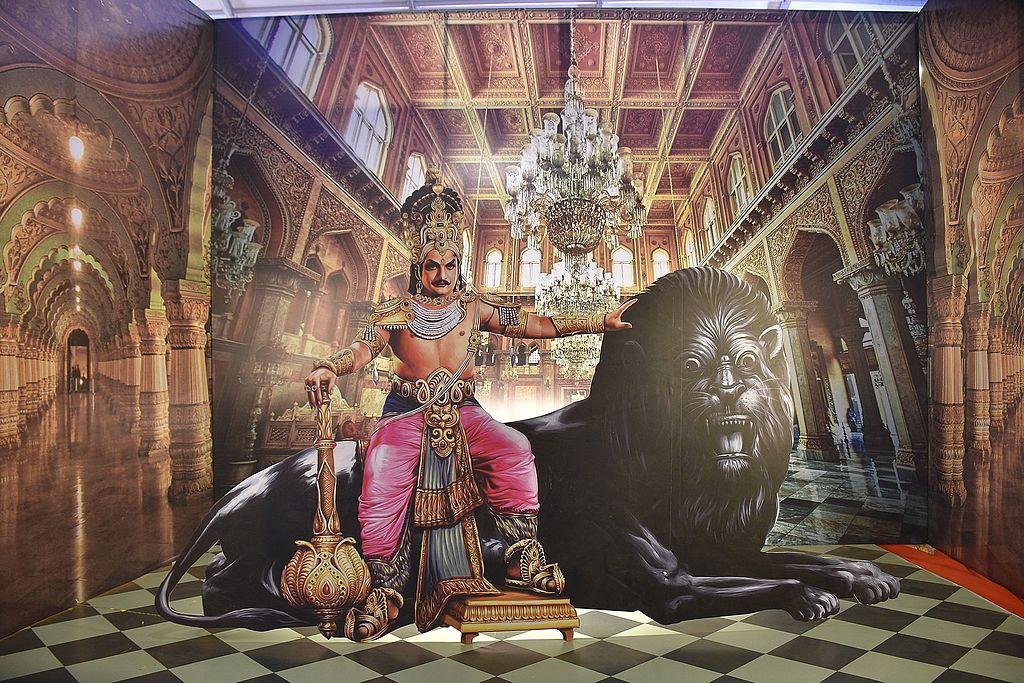
Responding to Krishna’s counsel, Arjuna shot arrows with calf’s-tooth heads that struck Karna’s robust body. Despite his numerous wounds and bleeding, Karna regained his composure and launched a barrage of arrows at Arjuna and Krishna. Arjuna skillfully countered Karna’s arrows in mid-flight and continued his assault on the now-defenseless Karna.
In his dire situation, Karna contemplated using the Bhargava weapon, infused with Brahma’s power, as a last resort. This mighty weapon had already inflicted significant damage on the Pandava forces. Karna believed it could distract Arjuna and provide him with the opportunity to tend to his wounds and replace his armor. He began reciting the sacred incantations to invoke the weapon but found that he could not recall them. Despite repeated attempts, the mantras eluded his memory. In dismay, Karna remembered his teacher’s (Parashurama) curse, which had foretold that he would be unable to summon his most potent weapon when his life depended on it.
Unable to invoke the Bhargava-astra, Karna resorted to using ordinary arrows to fend off Arjuna’s relentless barrage. As he released hundreds of arrows, he noticed a shadowy figure near his chariot. It was Kala, the personification of Time, who warned Karna that the earth was swallowing his chariot wheel. Karna, in his frustration, questioned the protection of virtue, as he had always upheld his duties, and wondered why his efforts in the battle were being thwarted.
Krishna reminds Karna of his Misdeeds
In the midst of their intense battle, Arjuna’s frustration grew, leading him to intensify his attack on Karna. Despite Karna’s desperate defense, Arjuna’s arrows penetrated deeply, causing Karna to stagger like a tree in a storm. Fueled by rage, Karna retaliated with a relentless barrage of fiery arrows, intercepting and shattering Arjuna’s shafts, some of which struck both Arjuna and Krishna.
Despite his injuries, Karna continued to fight fiercely. Krishna advised Arjuna to use more potent weapons, but Karna persisted in rendering Arjuna’s arrows ineffective while striking them with all his might. Arjuna attempted to invoke the Brahma weapon, but Karna swiftly severed his bowstring repeatedly, and this intense exchange repeated itself twelve more times, showcasing Arjuna’s swift bowstringing skills and Karna’s persistent efforts.
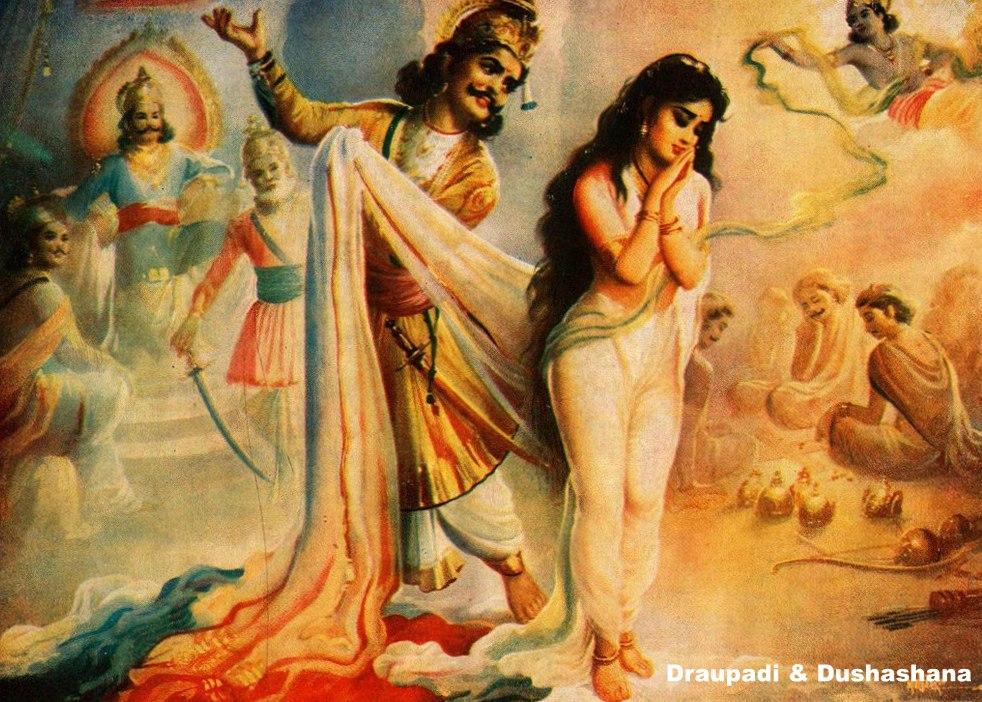
Impressed by Arjuna’s dexterity, Karna intensified his relentless assault, momentarily stunning his opponent with its sheer force. Seizing the opportunity, Karna leaped from his chariot and grasped the sunken wheel. With his powerful shoulders and robust arms, he resembled a massive sal tree with two formidable trunks. Straining with all his might, Karna’s efforts caused the earth to tremble, seemingly lifting up with all its lands, mountains, and seas. Nevertheless, the wheel remained lodged in the ground, frustrating Karna to the point of tears.
In his anguish, Karna beseeched Arjuna, “Partha, kindly wait a moment while I free my wheel. Do not entertain thoughts befitting cowards. Courageous and virtuous individuals never target unarmed foes. You are the bravest and most virtuous among warriors. Grant me this brief respite in my helpless state. I will return to the battlefield shortly. In accordance with virtue and the rules of warfare, withhold your attack until then.”
Upon hearing Karna’s heartfelt plea, Krishna smiled and responded, “Indeed, Karna, it is commendable that you recall virtue. Those in distress often blame fate, neglecting their own misdeeds. Karna, where was your virtue when Draupadi was brought weeping into the Kuru assembly? Did virtue guide your actions when Yudhisthira was stripped of his kingdom? Did it suggest the return of his kingdom after he spent his promised thirteen years in exile? Did virtue counsel setting fire to the wax house in Varanavata? Did it inspire your jesting remark to Draupadi to choose another husband? Was it virtue that ordered Dushasana to disrobe her? And when you and six other valiant heroes surrounded young Abhimanyu, was that virtue too?”
Karna hung his head in silence, his struggle to free the wheel growing increasingly frantic as Krishna continued, “If virtue guided you in all those instances, there is no need to invoke it now. You wish for us to embrace piety today, but your own life will not be spared. After defeating you and all their adversaries, the virtuous Pandavas will regain their kingdom.”
Karna remained unable to respond, trembling with anger as he persisted in his efforts to dislodge the wheel. Krishna moved the chariot away and instructed, “Arjuna, strike down Karna immediately with a celestial weapon.”
The Fall of Karna
Arjuna, his anger fueled by the recollection of Karna’s numerous sins, burned with fury. It felt as though heat radiated from his very pores as he raised the mighty Gandiva bow and invoked the Agneyastra. Karna, still unable to lift the sunken chariot wheel, swiftly leaped back onto his chariot. With his bow in hand, he countered Arjuna’s weapon using the Varunastra. Despite his desperate situation, Karna continued to fight, releasing a relentless barrage of powerful arrows. He then selected a massive steel arrow adorned with gold and equipped with a long, barbed tip. As he launched it from his taut bowstring while chanting mantras, darkness suddenly enveloped the four quarters. Violent winds whipped about, and celestial beings let out mournful cries. The Pandavas were seized by apprehension and turned to Krishna in prayer.
Karna’s arrow shot from his bow like a thunderbolt, striking Arjuna squarely in the chest. Even penetrating his seemingly impenetrable armor, it caused Arjuna to convulse violently, and he dropped the Gandiva.

Once again, Karna descended from his chariot and grappled with the sunken wheel in frustration, but his efforts proved futile. Roaring with anger, he was met with Arjuna regaining his composure and drawing an anjalika arrow. Placing it on his bow, Arjuna infused it with the celestial might of Indra’s Vajra weapon. Krishna approached Karna and urged, “Arjuna, release this arrow without delay and sever your enemy’s head before he returns to his chariot.”
With the Gandiva pulled back to his ear and his aim steady, Arjuna declared, “If I have ever practiced austerity, respected my elders, and heeded their sage counsel, then may this arrow be the instrument of Karna’s demise.”
As Arjuna released the arrow, it streaked forth from his bow, radiating a brilliance like the sun. The entire battlefield was illuminated by its path as it homed in on Karna. This formidable shaft found its mark while Karna still wrestled with his chariot wheel. Striking him on his broad, powerful neck, it cleanly severed his head, sending it plummeting to the earth. As the handsome head descended, much like the setting crimson sun sinking behind the western hills, Karna’s lifeless trunk crumpled, releasing torrents of blood. Before the eyes of all, a radiant light emerged from Karna’s body, ascending into the sun.
The Pandavas erupted in cheers, drums reverberated, and trumpets resounded. Arjuna and Krishna, brimming with joy, sounded their conches, surrounded by jubilant warriors who praised and danced in celebration on the battlefield. They gazed in astonishment at Karna’s fallen form, which resembled a quenched fire or a mountain struck down by divine lightning.
Salya slowly steered Karna’s chariot, now devoid of its hero, away from the battlefield. Witnessing this mournful sight, the Kauravas were plunged into grief, their hopes utterly shattered. They fled in terror, casting frequent backward glances at Arjuna’s blazing standard.